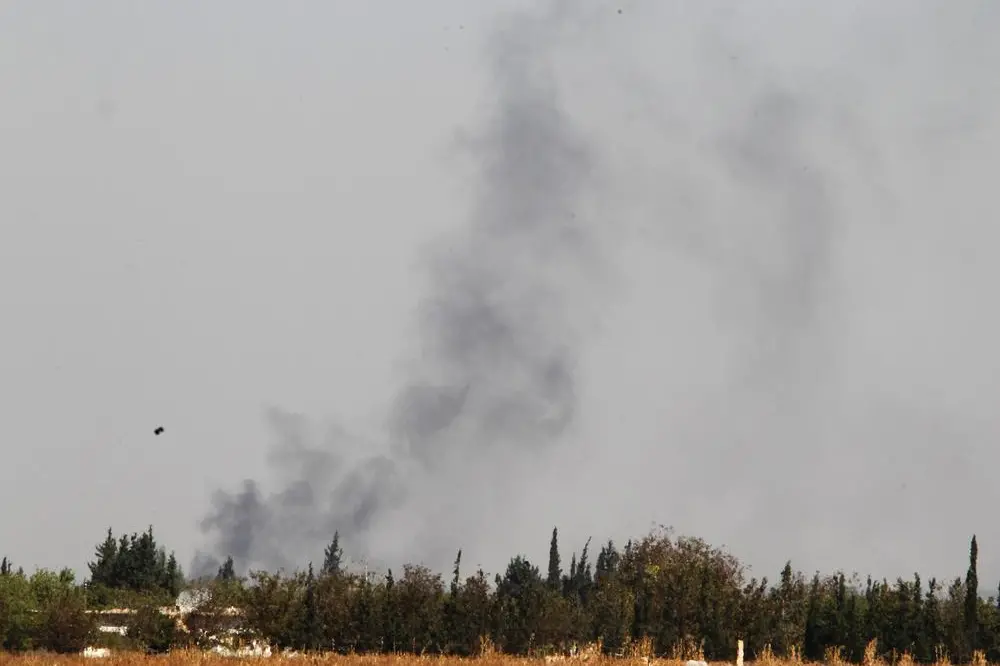PHOTO
By Umberto Bacchi
ROME, April 3 (Thomson Reuters Foundation) - Syria's six-year conflict has caused at least $16 billion in damage to agriculture - about a third of the country's GDP - a U.N. agency said on Monday, calling for more funds to salvage local food production as millions go hungry. Fighting has led to extensive crop and livestock losses and destroyed greenhouses, veterinary clinics, irrigation systems, tractors and other assets, the U.N. Food and Agriculture Organization (FAO) said in a report - the first to provide a comprehensive assessment of the war's impact on agriculture.
Food production dropped to an all-time low last year, with many farmers forced to abandon their land.
urn:newsml:reuters.com:*:nL8N1DG4UO
Those remaining urgently need basic supplies like fertilizer, seeds and medicines for livestock in order to revamp production, but funds are scarce, the FAO said.
"Ramping up investment in the recovery of the agriculture sector could dramatically reduce the need for humanitarian aid," FAO Director-General Jose Graziano da Silva said in a statement.
"It could also have a significant impact on stemming the flow of migrants."
Rebuilding the agricultural sector would cost between $10.7 and $17.1 billion over the first three years, depending on how the conflict develops, the report said.
The analysis, based on surveys last September of more than 3,500 households across the country, found that Syria's rural population had more than halved since 2011.
Nine in 10 families now spend more than half their income on food, up from 25 percent before the war, due to soaring food prices and the decline in farming income, it said.
More than 7 million people in Syria are classified as "food insecure", meaning they are not always sure where their next meal is coming from, according to the FAO.
Since the conflict began in March 2011, almost half a million people are estimated to have been killed and more than 11 million, about half the population, are displaced either internally or as refugees.
urn:newsml:reuters.com:*:nL5N1GS453
(Reporting by Umberto Bacchi @UmbertoBacchi, Editing by Emma Batha. Please credit the Thomson Reuters Foundation, the charitable arm of Thomson Reuters, that covers humanitarian news, women's rights, trafficking, property rights, climate change and resilience. Visit
http://news.trust.org
) ((Umberto.Bacchi@thomsonreuters.com;))
ROME, April 3 (Thomson Reuters Foundation) - Syria's six-year conflict has caused at least $16 billion in damage to agriculture - about a third of the country's GDP - a U.N. agency said on Monday, calling for more funds to salvage local food production as millions go hungry. Fighting has led to extensive crop and livestock losses and destroyed greenhouses, veterinary clinics, irrigation systems, tractors and other assets, the U.N. Food and Agriculture Organization (FAO) said in a report - the first to provide a comprehensive assessment of the war's impact on agriculture.
Food production dropped to an all-time low last year, with many farmers forced to abandon their land.
Those remaining urgently need basic supplies like fertilizer, seeds and medicines for livestock in order to revamp production, but funds are scarce, the FAO said.
"Ramping up investment in the recovery of the agriculture sector could dramatically reduce the need for humanitarian aid," FAO Director-General Jose Graziano da Silva said in a statement.
"It could also have a significant impact on stemming the flow of migrants."
Rebuilding the agricultural sector would cost between $10.7 and $17.1 billion over the first three years, depending on how the conflict develops, the report said.
The analysis, based on surveys last September of more than 3,500 households across the country, found that Syria's rural population had more than halved since 2011.
Nine in 10 families now spend more than half their income on food, up from 25 percent before the war, due to soaring food prices and the decline in farming income, it said.
More than 7 million people in Syria are classified as "food insecure", meaning they are not always sure where their next meal is coming from, according to the FAO.
Since the conflict began in March 2011, almost half a million people are estimated to have been killed and more than 11 million, about half the population, are displaced either internally or as refugees.
(Reporting by Umberto Bacchi @UmbertoBacchi, Editing by Emma Batha. Please credit the Thomson Reuters Foundation, the charitable arm of Thomson Reuters, that covers humanitarian news, women's rights, trafficking, property rights, climate change and resilience. Visit





















